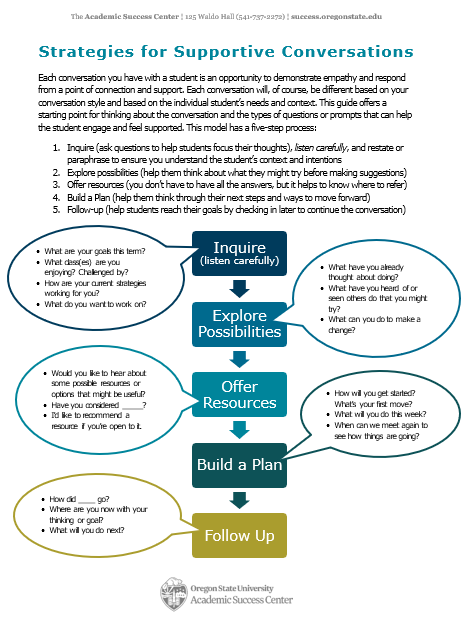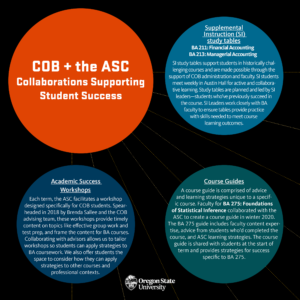by Sarah Norek
At the ASC, I coordinate the Transition Communication Campaign (TCC): a series of weekly emails that are sent over the course of a year to first year (FY) and new-to-OSU transfer (TR) students. The campaign was designed to support students through timely academic support and advising information, as well as other resources and strategies to help them navigate and succeed in the university setting.
Since taking the project on in 2019, I’ve been able to roll-over content relatively easily term-to-term. Beginning last spring, however, and throughout this year, I’ve worked to adapt messaging to reflect the current COVID-19 context and its complex and evolving impacts on student life and experience. I’ve thought a lot about how to use the TCC to support students during this unique time. Here are some key ideas I continually return to:
Reflection
Nearly all TCC messages invite some kind of reflection, asking students to tap into their incredible knowledge and expertise of themselves. We are all so electric, so full of experiences, our narratives so unique to us. Self-awareness offers the opportunity to ground ourselves in our transition experience—to recognize discomfort, to uncover its roots, to work to address it, or to sit with it and progress through it, and of course, to learn what’s working for us and how. In asking students to reflect, I invite them to recognize the incredible work and energy they’re putting forth; to listen to their experience; and to be open to the potential adaptation in strategies and approaches to study, work, self-care, and more.
Resources
I spotlight resources in each TCC for two reasons (and more): 1) to help students become familiar with their many resource options early in their time at OSU, and 2) to impart the value of help help-seeking and asking questions—especially when navigating the transition to university-level learning (and all the subsequent transitions from course to course, discipline to discipline, etc.). As many of this year’s new students transition into OSU remotely, accessing resources can be even more important. Support, connection, and community are especially crucial to well-being these days and when making a remote transition into the university.
Repetition
Transition can be consuming; it can be a whirlwind. This means sometimes pertinent information—no matter how helpful—might not land after a single introduction. Sometimes we need repetition and the opportunity to encounter and explore information a few times before it sticks. Whether it’s a university process, encouragement to meet with an advisor, or a reminder to be generous with themselves—repetition may help students encounter the important information when they are ready to explore or act on that information. We use repetition not just for important dates or reminders, but also for acknowledging and validating what students are experiencing. I want students to hear and internalize that the OSU community cares about who and how they are.
Looking Ahead
What’s funny to me is that, in all of this transition messaging, the fact that spring term will be our year anniversary of remote operations didn’t really hit me until quite recently. Like, quite. I’ve carved out very little time to consider my own transition(s) over the past year. Adapting the TCC to fit students’ current needs offers, in retrospect, an opportunity for me to reflect on my own experience and needs, too. Just as I hope students will engage in reflection and tap into self-awareness, I too can benefit from contemplating what kind of spring I want to create, what I can offer, how I’ll show up and for whom, and what I can hold onto—in terms of mindset, productivity, strategies—or else cut loose.
In the process of drafting this, it was pointed out to me that repetition is a form of support—a way of allowing ourselves grace as we navigate an ever-changing landscape. It’s okay, and important, to keep repeating the questions, returning to the thinking, listening and trying to make this reflective practice routine. As for resources, I can take the TCC’s advice and actively seek them out, too. These days, my colleagues and teammates are my core resources. It’s surprisingly easy to work in isolation, and surprisingly (for me, an introvert) lonely. I’ve been trying to reimagine and create new shared spaces, while considering boundaries and vulnerability, hungry to feed these connections while not furthering anyone’s fatigue.
Whether you’re contemplating your own experience with transitions, or providing support for others as they navigate transitions, I offer these thoughts not as a prescriptive route through the work but because I hope they present opportunities for our individual experiences to be explored, supported, and validated along the way.



